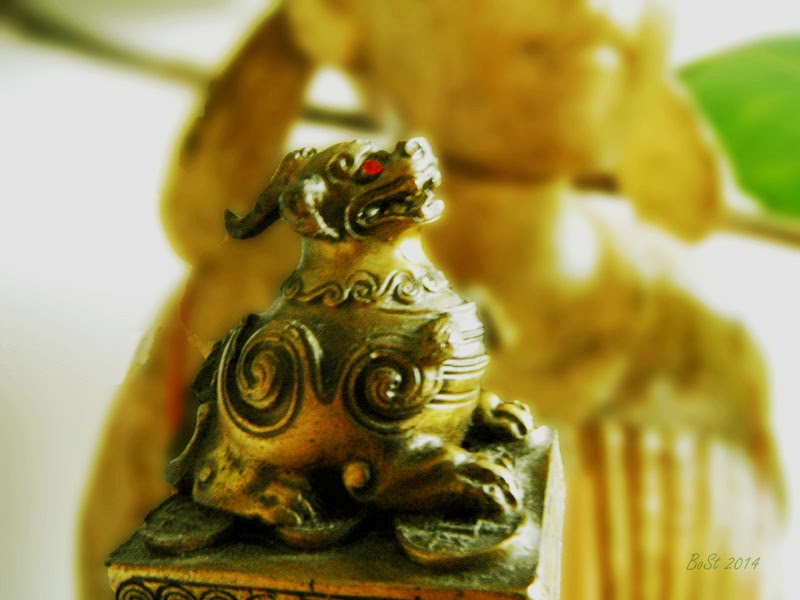The 2014 Annual Afflictions Part 2
Tai Sui (The Grand Duke of Jupiter)
Tai Sui, Grand Duke of Jupiter or also known as “General of Time Gods” (Yin Jiao), is a very important aspect of Chinese Astrology. Tai Sui refers to stars directly opposite to Jupiter and sometime refers to the rotation of Jupiter. In any case they are known to influence the Chinese zodiac and are involved in religious Taoism and Feng Shui.
Jade Emperor in Heavenly Court
Meanwhile, those whose Chinese Zodiac offends, or by their sign clash with the Tai Sui of the year, are advised to go through a prayer session with a Taoist Priest to ask for blessing in obtaining Peace and Good Fortune throughout the year. If for whatever reason one can’t do this then there are Talismans for protection against Tai Sui.
In the Year 2014 Year of the Horse the ruling Tai Sui is Zhang Ci, and it falls on sector South 2; Tai Sui in this year is in conflict with the Rat. It is also imperative for those born in the years of Horse, Rat, Rabbit and Rooster to have the protective talisman shown below. However, it is highly recommended for everyone to carry one even if his or her horoscope sign is not in conflict, directly or indirectly with Tai Sui because you may unknowingly sleep or sit facing him, which will also incur his wrath. Better to be safe than sorry!
The position of the ruling Tai Sui in the subsequent years are: In the Year 2015 Year of the Sheep, the ruling Tai Sui is Yang Xian, and it falls on sector South West 1; Tai Sui in this year is in conflict with the Ox. In the Year 2016 Year of the Monkey, the ruling Tai Sui is Guan Zhong, and it falls on sector South West 3; Tai Sui in this year is in conflict with the Tiger.
As mentioned earlier, this year 2014 Tai Sui resides in the South (and between 142.5º – 157.5º southeast which is only 15 degrees span). Inactivity must therefore be strictly observed so as not to incur its wrath. The Tai Sui conflict is a serious affliction that must not be taken lightly. Tai Sui dislikes noise and commotion. All groundbreaking work, construction work, any renovation/repair work or moving into a new home (that faces the Grand Duke) had best be avoided. When activities are carried out it is deemed a challenge to his authority and a petrifying backlash will likely ensue.
Those afflicted will suffer lots of arguments, legal problems, financial losses, bad luck, illness, injuries, surgery, career setbacks, calamities, and fatalities at home and at work.
Also do not directly confront Tai Sui in the dining room and at work, but it’s okay to have your back facing him. Always avoid sitting with your back to the north otherwise you will find yourself harassed by unscrupulous people and also encounter undue gossip and back stabbing all during 2014. Do not sleep with your head pointing to the direction of Grand Duke Jupiter.
For houses that are facing south you are considered as in confrontation mode with the Tai Sui. For such case, it is better to display the Grand Duke Tai Sui Plaque at home as a way of paying deep respect to the deity and seeking blessings from Him. This is a common method of acknowledging the goodwill of Tai Sui as the Heavenly Divine One who is in charge of the year. And you will have to carry along the Grand Duke Charm because you are considered as either offending or confronting the Tai Sui, even if their zodiac constellation is not affected.
In 2014 place the Tai Sui Plaque 2014 with Appeasing Mantra in the South where the Tai Sui resides this year, to invite the goodwill of the powerful General Zhang Ci. This protects against offending him and cultivates his support in all our worldly endeavors – for health, wealth, love, peace and happiness.
Tai Sui Plaque with appeasing mantra
Pixiu or Pi Yao
Pi Yao (PIxiu) is a Chinese mythical hybrid creature considered to be a very powerful protector by Feng Shui practitioners. It resembles a winged lion. Pixiu is an earth and sea variation, a particularly influential and auspicious creature for wealth. Fierce looking and covered with whitish-grey fur, Pixiu has the head of a Chinese dragon. Ancient Chinese depictions of Pixiu showed two different types of Pixiu. The difference is with their horns; the male has the single antler, and the female two. The the male with one horn is called Tian Lu (Pi Chen) and female with two horns is known as Pi Ya . Tian Lu is in charge of wealth and displaying Tian Lu at home or in the office is said to prevent wealth from flowing away. Another interesting note is the belief that common wingless Pixiu assists in seeking wealth while a winged Pixiu assists students in furthering their studies.
The Pixiu is ranked 5th in the order of mythical beings, behind the dragon, phoenix, winged horse and sea horse. Ancient architecture often displayed Pixiu to ward off Yin Qi (bad fortune). The statues of a Pixiu are typically seen on the four corners of the roofs of houses, particularly those of influential people such as the emperor. In ancient China, statues of Pixiu were also used as tomb guardians.
The myth behind the Pi Yao (Pixiu) is that the creature at one time had violated the law of Heaven, and so the Jade Emperor had punished Pixiu by restricting its diet to gold. Thus Pixiu can only absorb gold, but cannot expel it. This is the origin of Pixiu’s status as a symbol of the acquisition and preservation of wealth. It is said to have a voracious appetite for only gold and silver. Therefore traditionally to the Chinese, Pixiu has always been regarded as an auspicious creature that possessed mystical power capable of drawing Cai Qi (good fortune) from all directions.
Displaying a Pi Ya at the affected area of the house or office can avoid misfortune and disasters. The Pi Ya must be placed facing away from the house. For displaying at openings or entrances a pair of Pi Ya is needed.
The Tian Lu is used for attracting wealth. One places it in the designated wealth area to attract wealth or accumulate wealth. Do not place Tian Lu facing any person directly on in a confrontational position. Ideally Tien Lu should not be place on the floor but it definitely should never be place above eye level.
One cannot touch the face and head of the "Pixiu," because the touch from an ordinary person would ruin their wealth.
Pixiu (Pi Yao), a fierce creature has large fangs, visible in the creature’s mouth, with which it attacks demons and evil spirits, draining their essence and converting it to wealth. Pi Ya is useful therefore in warding off evil. Pixiu is also believed to guard against disease caused by evil spirits. Furthermore, Pi Ya has the ability of assisting anyone who is suffering from bad Feng Shui due to having offended the Grand Duke Jupiter (Tai Sui).
Tai Sui is very fond of his pet, the Pi Yao. You may appease Tai Sui therefore, by placing a Pi Yao or Dragon-headed Tortoise in the north sector of the home or office facing the 15º south radius where Tai Sui sits. For this cure, the placement of the Pi Yao should be obvious and not hidden from view, and there must be a metal element involved. Metal here refers to real gold and strong metal. The secret behind this cure is that the "Tai Sui mantra" must accompany the Pi Yao for maximum effectiveness. It actually refers to a set of Chinese incantation of the Tai Sui. This mantra had been used for centuries to help one overcome the wrath of Tai Sui.
Tai Sui appeasing
mantra
Good Luck.









No comments:
Post a Comment